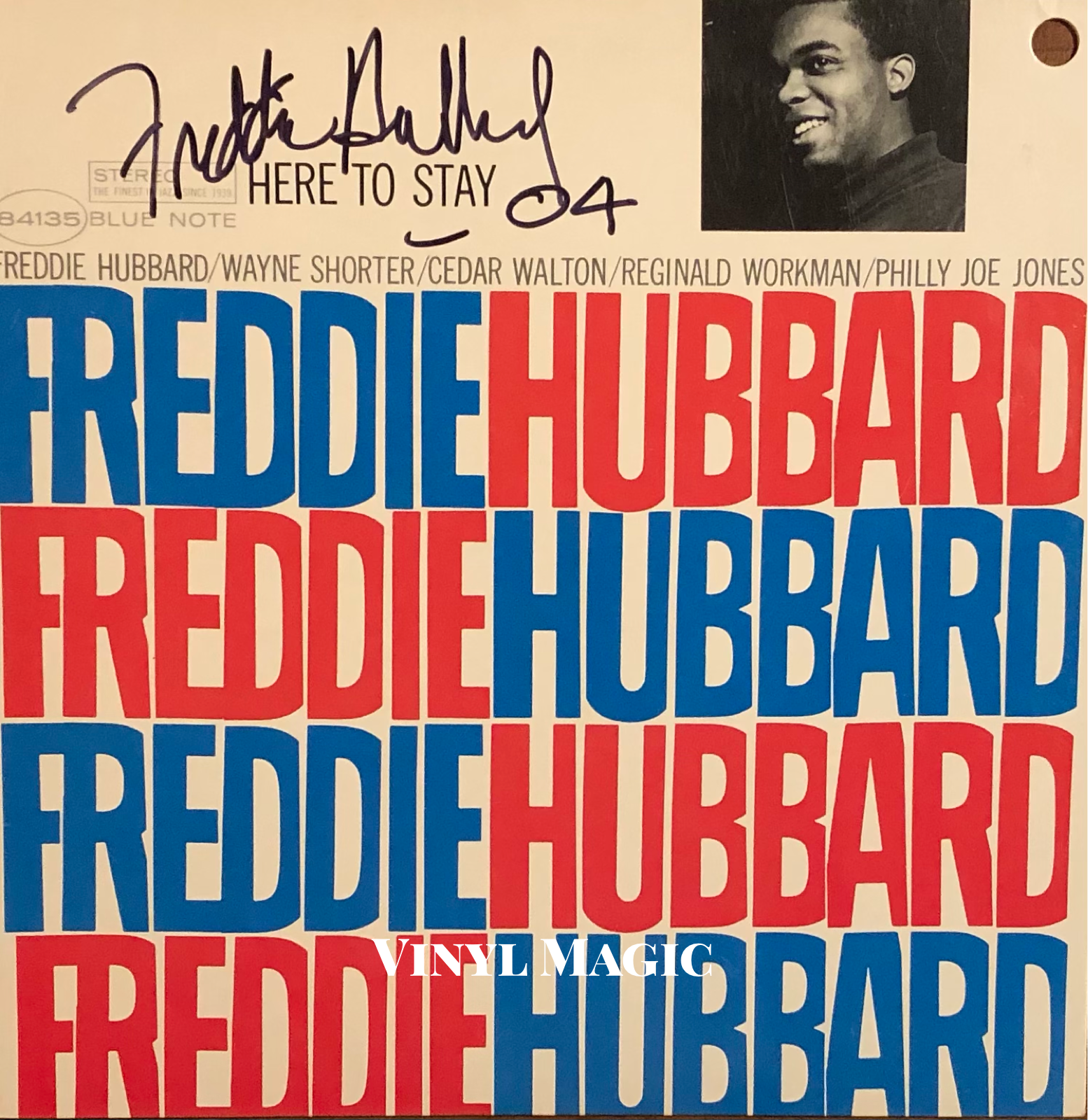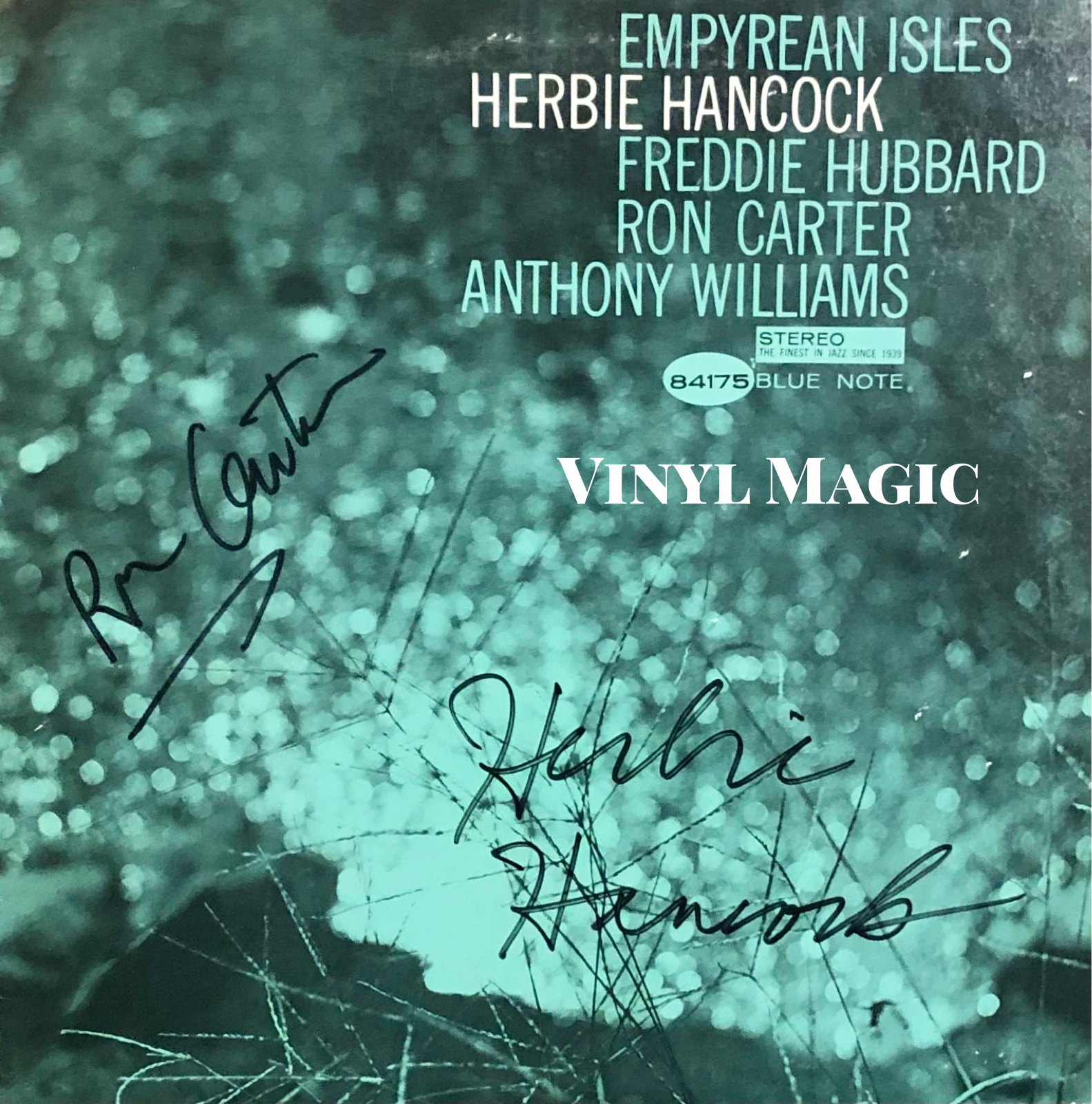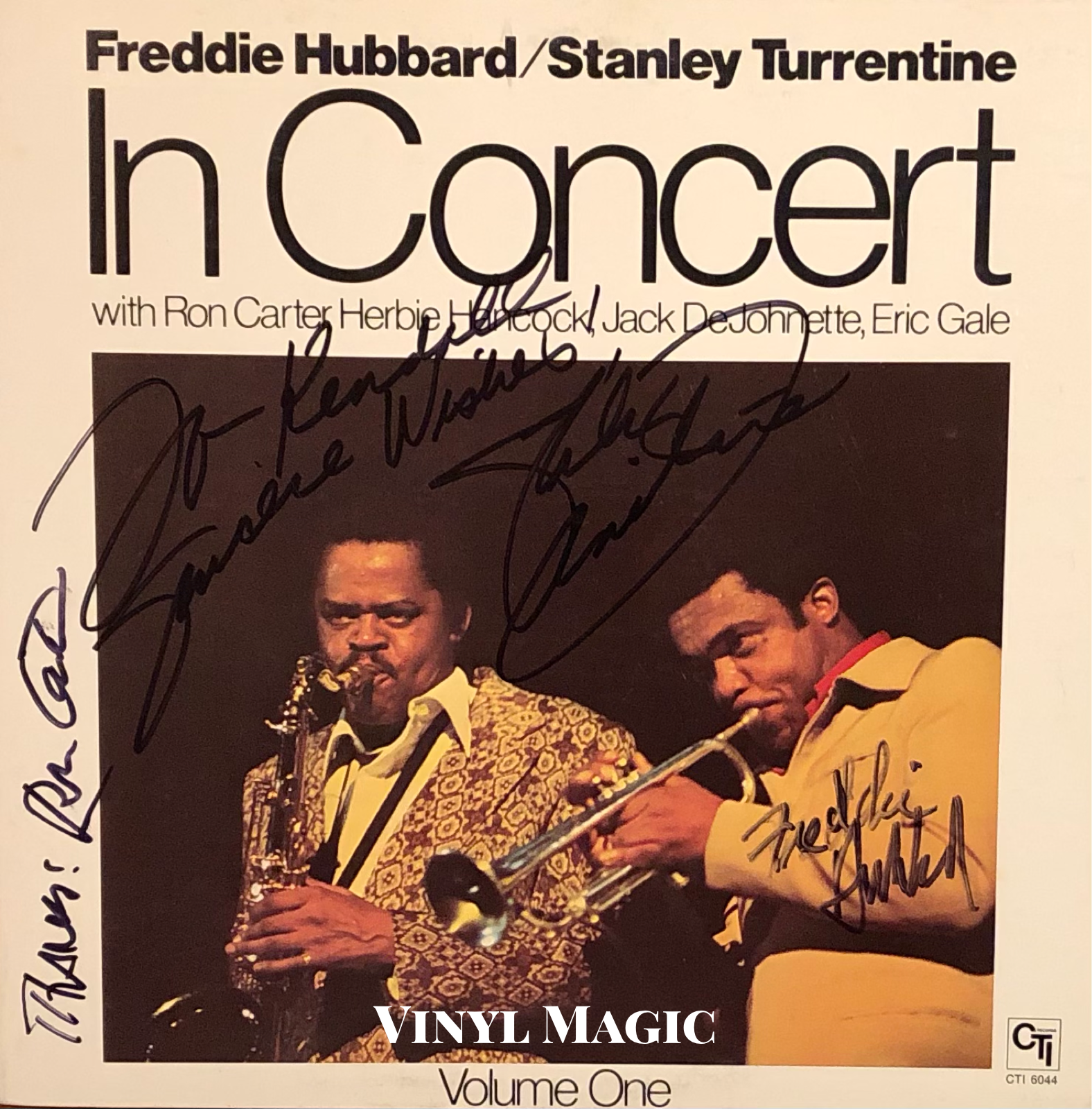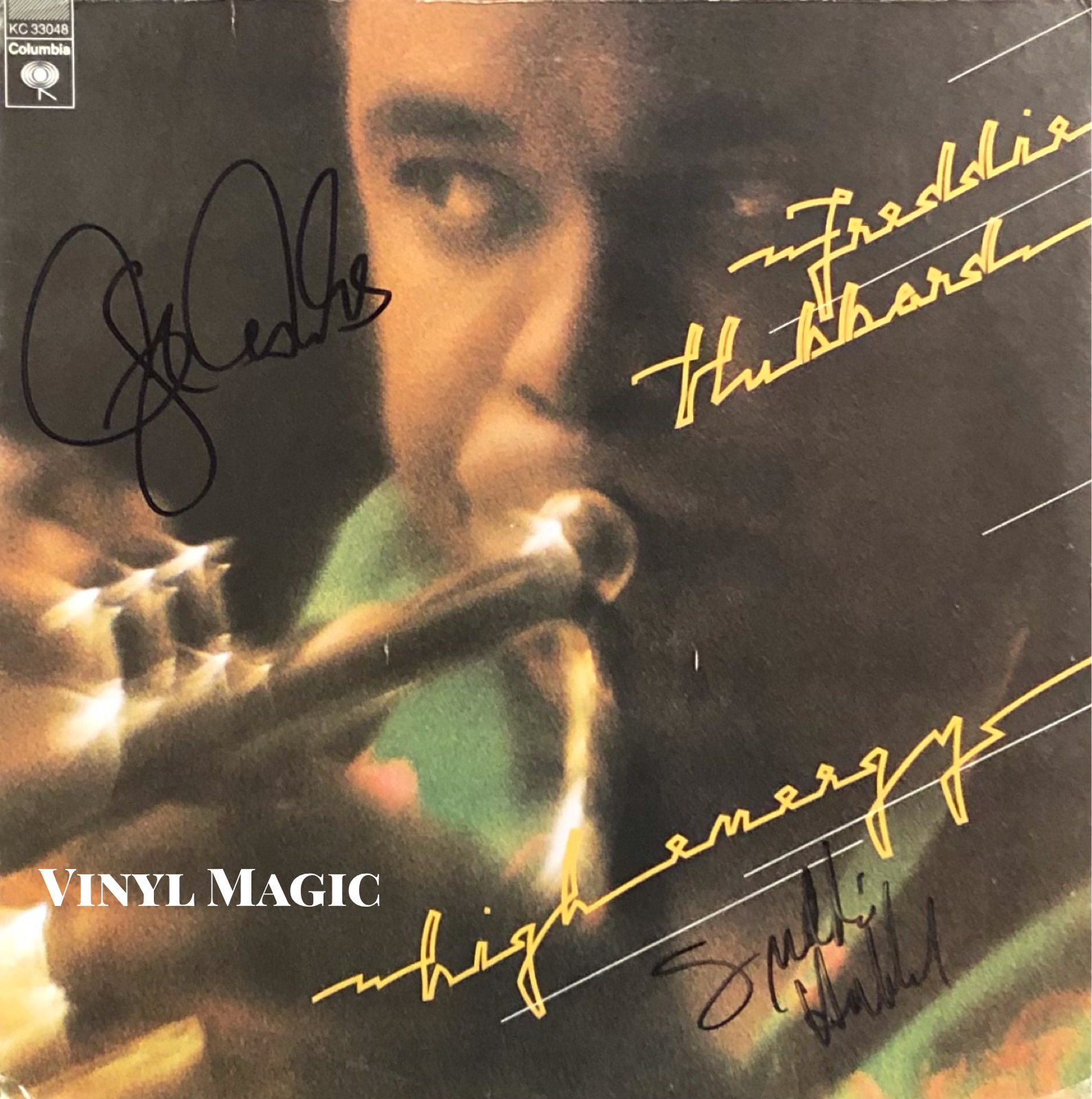Freddie Hubbard and Me...
Dizzy used to tell me that I am playing too hard. He used to say to not give everything. Miles used to tell me that too.
Freddie Hubbard
Here To Stay (1962) signed by Freddie
I started practicing with tenor players. I’d hear what Rollins and Trane would do, and their passages were so involved, so hip, that I figured it’d make me sound different. But passages that come naturally to a saxophonist don’t come easy to a trumpeter. You need a lot of elasticity, because your embouchure is so different than a tenor player’s. You can’t play a trumpet as long as you can a tenor, because the mouthpiece is against your lips while the tenor’s mouthpiece is inside your lips. If you’re going to play lots of choruses like Trane and Sonny, you have to be really strong. When I practiced with Sonny, he’d have me lift weights to build up my strength.
Freddie Hubbard
Takin’ Off (1962) signed by Herbie Hancock
He always had the confidence to experiment and try things. He was able to funnel all these different trumpet players, all the way from Louis Armstrong down to Dizzy and Miles, until he found his own voice. That’s what I think this music is all about, finding your own voice. When you heard Trane, you knew it was Trane. When you heard Dizzy, you knew it was Dizzy. When you heard Freddie, you knew it was Freddie.
James Spaulding
Empyrean Isles (1964) signed by Herbie, Ron Carter
Freddie Hubbard, a great American jazz trumpeter and composer, was born in Indianapolis in 1938. He studied and played with local stars Wes Montgomery, Larry Ridley and James Spaulding. In 1958, Freddie moved to New York City and he began to play sessions with some of jazz's biggest stars, including Sonny Rollins, John Coltrane, J.J. Johnson, and Art Blakey.
Ugetsu (1963) signed by Freddie, Curtis Fuller, Cedar Walton, Reggie Workman
Freddie made over seventy albums as a leader and he appeared on over one-hundred as a sideman. He played on some of the most important jazz recordings in history: Eric Dolphy's Out To Lunch, John Coltrane's Ascension, Ornette Coleman's Free Jazz, Herbie Hancock's Maiden Voyage, and Oliver Nelson's The Blues And The Abstract Truth. His scorching trumpet could be loud and furious and puncture the air in sudden, staccato and sustained bursts, or incredibly tender and melodic as he stretched out over a soulful ballad. He was also a noted composer: "Up Jumped Spring", "Red Clay", "Byrdlike", and "Little Sunflower" are just a few melodies that Freddie added to the jazz standard canon.
Maiden Voyage (1965) signed by Herbie, George Coleman , Ron Carter
I saw Freddie many times over the years and he was a dynamic performer, especially in the mid 1980s when his chops were still so powerful. In 1992 at the Blue Note in New York City, he was headlining a band that was paying tribute to the great Dizzy Gillespie, who was in failing health. Freddie couldn't reach the high notes anymore, but he persevered. After the show, I went to his dressing room to get some albums signed. He was really disappointed with his performance, as his lip had formed a nasty blister. My wife, Erin, reached into her purse and gave him some Mycitracin as a lip balm. Freddie was very appreciative as he had several more shows to play that week. The itinerant life of a jazz man, Freddie went to Helsinki the next week where the blister burst. Unfortunately, Freddie was forced to stop playing for several years as his embouchure never fully recovered. It was such a tragedy, Freddie was only fifty-four years old.
Backlash (1967) signed by Freddie
Near the end of his touring career in 2004, I saw Freddie perform at The Iridium in New York City. His hard blowing days were long gone. Freddie was leading an octet, and he was playing the flugelhorn, a much less taxing instrument. After the show, I spent twenty minutes with Freddie in his dressing room talking about his career. He was very reflective and wistful. I told him it was great to have him back in New York. He said, "I was just a kid when I moved here, barely twenty. I moved into an apartment in Harlem. Man, I saw stuff out in the streets that I never saw in Indianapolis. The first week I was there, there was a terrible smell in my apartment building. It turned out a neighbor on the floor above me had hung himself. And they didn't find him for a couple of weeks. That was crazy."
The Hub Of Hubbard (1970) signed by Freddie, Richard Davis, Louis Hayes, Sir Roland Hanna
What about John Coltrane? "Man, Trane showed me so much. He practiced, practiced, practiced. He would play 10-12 hours a day. I had a reputation when I got here (for being a hot trumpet player), but he showed me, you had to put the work in."
In Concert (1973) signed by Freddie, Stanley Turrentine, Ron Carter
How do you like living in California? "Man, there's so much energy in New York, I miss it. Most days in California, I don't know if it's 7am or 7pm. It all just blends." I witnessed a steady stream of jazz musicians coming backstage to pay homage. "And all these great musicians and doctors, I think I should move back here and get healthy," he added.
The Blues And The Abstract Truth (1962) unsigned
As he signed some albums, I asked him his favorite. Freddie replied quickly, "The Blues And The Abstract Truth.". I bet you don't have that one?" Yes, I assured him I did, ‘That was a tremendous band with Bill Evans on piano, Oliver Nelson on sax, and Roy Haynes on drums, and "Stolen Moments" and "Yearnin" are classic songs. I'll have to bring it along next time,’I told him. Sadly, there was no next time. Freddie passed away in 2008, but he left an amazing legacy through his many recordings and compositions.
Freddie Hubbard, one of the greatest jazz trumpeters ever, and a real gentleman.
Keep Your Soul Together (1973) signed by Freddie, George Cables, Ron Carter
Trumpet Summit (1980) signed by Clark Terry
High Energy (1974) signed by Freddie , George Cables
Ride Like The Wind (1982) signed by Freddie
Choice Freddie Hubbard Cuts (per BKs request)
https://www.youtube.com/watch?v=otFVFLtRF_s
“Cantaloupe Island” with Herbie Hancock 1964
https://www.youtube.com/watch?v=RbaGDDbpcQ4
“Stolen Moments” with Oliver Nelson 1961
https://www.youtube.com/watch?v=VyPwD_Un7bE
“Backlash” with Ray Barretto 1967
https://www.youtube.com/watch?v=_QkGAaYtXA0
“Watermelon Man” with Herbie Hancock 1962
https://www.youtube.com/watch?v=5tnxHTGYsKU
“Lotus Blossom” with Woody Shaw 1985
https://www.youtube.com/watch?v=rjU0Gryw8LY&list=PL8a8cutYP7frqkgWrnWbWg0wcJoGjkxXg&index=1
“Open Sesame” 1960
https://www.youtube.com/watch?v=NwvxiBEPDdA
“First Light” 1971
https://www.youtube.com/watch?v=wA1ZelIbUfI
“Red Clay” 1970
https://www.youtube.com/watch?v=EWC5x9G45yo
“Maiden Voyage” with Herbie Hancock
https://www.youtube.com/watch?v=kuGO8IY50b4
“I Remember Clifford” live with Art Blakey 1984













